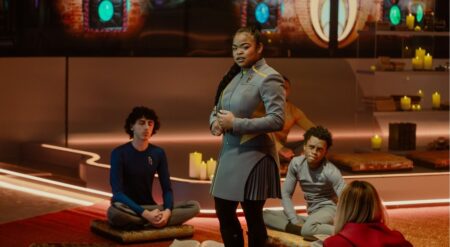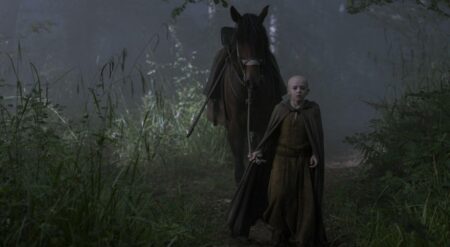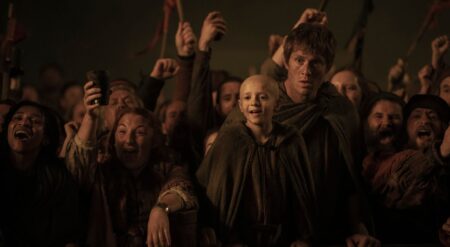There’s a lot going on in the Disney+ series Dragons of Wonderhatch. With severe tonal clashes, the series tries (and often fails) to create something based on whimsy and the fantastical. Where there should be magic, there’s a bevy of subplots and opposing energy-seeking stability. This is partially built into the series with its deliberate cross between anime and live-action to help distinguish the two worlds of the show. Elsewhere, though, the story is part family-friendly adventure, part action series where characters are bodily thrown from buildings, and part coming-of-age story with a fantasy twist. It’s a mess.
Dragons of Wonderhatch Season 1 primarily follows Nagi (Sena Nakajima), a high school student in Yokosuka, Japan, who doesn’t fit in with her classmates. A daydreamer, she states early that when she “looks at reality, all I see is disappointment.” She lives in the real world and sees colors whenever she hears sounds. Thaim (Daiken Okudaira, Insomniacs After School) lives in the alternate world, Upananta. A dragon rider, he profoundly admires Hero Akuta (the consistently superb Mackenyu Arata). One day, Akuta disappears from Upananta, and Thaim makes it his mission to find him, leading him to Nagi.
Of course, there’s plenty more that rests beneath the surface. In the human, live-action world, Akuta initially takes to drinking himself into a stupor. Known as a listener, he can hear the thoughts of those around him and desperately tries to quiet them. Another Upanantan who landed in Japan has been there for ten years and is ready to remake the human world into his own, disillusioned by humanity’s greed and violence. As more members of Upananta end up in Nagi’s world, the more she realizes that her mother might have something to do with the creation of Upananta and the bridging of worlds.
It’s not wrong to have so much going on in a series, but the pacing of it is a deterrent. While there are individual threads that work — everything to do with Mackenyu’s Akuta since the actor is inherently watchable and charismatic — many fall short. The most grievous element of this is Thaim’s character. He fails to live up to the protagonist nature that the show wishes to slot him into, too fumbling and naive. Every character is more interesting than he is, and yet Thaim has the bulk of screen time, even seemingly surpassing Nagi, whose story is much more engaging. It doesn’t help that Okudaira’s performance does little to make Thaim charming. Okudaira relies on affected tics to guide his performance when he needs more remarkable restraint. But honestly, it doesn’t help when Mackenyu is his screen partner.

But even Mackenyu isn’t given enough to do despite having the more emotionally developed storyline of the series. A disillusioned hero turned social pariah turned savior once more, he’s given an entire arc and character journey. But the conclusion to his story is rushed. Also, given his athleticism and skills in onscreen combat, the lack of fight choreography he’s given is a shame.
The animated sequences, created by Production I.G., are also some of the most vital elements of the series. While the animation lacks the studio’s signature verve and physicality, it offers greater visual cohesion than the live-action elements. With a mix of 2D and 3D animation, such as bringing dragons to life in the real world, the live-action elements are clumsy when it reaches for fantasy. Kentarō Hagiwara directs the live-action sequences, while the anime segments are helmed by Takashi Otsuka.
It’s charming at times, especially with special effects elements are reminiscent of Doctor Who. But it becomes a drawback when the clunkier special effects also impact critical action scenes. It makes sense why the series split between animation and live-action to distinguish the worlds. That said, a fully animated version of the show would significantly improve the overall effect.
There’s no doubt an audience for Dragons of Wonderhatch with its wholesome coming-of-age story. And there’s something to be said about the show’s ongoing message about how imagination opens doors to new worlds. The series brings this literally to life in the show while also being an integral part of storytelling. We tell stories and consume them to open our scope of the world. We want to see realms we’ve never dreamt of, and peek into the lives of those we’ve never met. It’s an intriguing idea to build a show off of, of how one person’s story can have ripple effects and open up an actual, physicalized world.
But unfortunately, that’s the failing of Dragons of Wonderhatch, even if it’s also its triumph. Too often, the series is a bunch of solid ideas that miss the landing. There needed to be a great urgency in its storytelling and greater coherence as no less than three significant storylines compete for attention. It’s lightweight storytelling that could’ve afforded itself gravity to its emotional depth. It is a story of longing for more, of prioritizing and cultivating imagination; there needed to be wonder in the story, and not just the name alone.
Dragons of Wonderhatch Season 1 is available now on Disney+.
Dragons of Wonderhatch
-
Rating - 5.5/105.5/10
TL;DR
‘Dragons of Wonderhatch’ is lightweight storytelling that could’ve afforded itself gravity to its emotional depth. It is a story of longing for more, of prioritizing and cultivating imagination; there needed to be wonder in the story, and not just the name alone.







